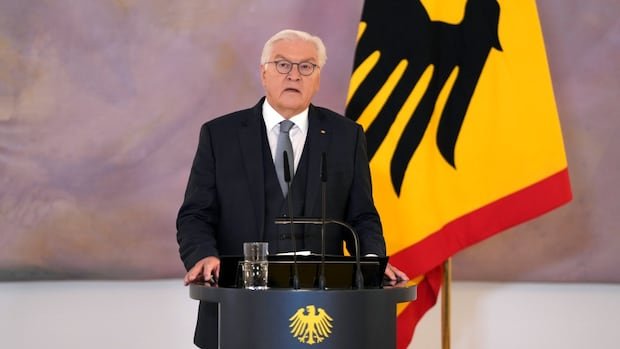Federal President Frank-Walter Steinmeier ordered the dissolution of parliament on Friday after the failure of Chancellor Olaf Scholz’s government coalition and scheduled new elections for February 23rd. He said this was the only way to give the country a stable government capable of addressing its problems.
Scholz lost a vote of confidence on December 16 and leads a minority government. His unpopular and notoriously bitter three-party coalition collapsed on November 6 when he fired his finance minister amid a dispute over how to revive Germany’s stagnant economy.
Steinmeier said he made the decision because, after consultation with party leaders, it was clear that there was no agreement among German parties on a majority for a new government in the current parliament.
“Especially in difficult times like these, stability requires an effective government and a reliable majority in parliament,” he said when making his announcement in Berlin.
“That’s why I am convinced that new elections are the right path for the good of our country.”
Since the constitution after the Second World War did not provide for the Bundestag to dissolve itself, it was up to Steinmeier to decide on the dissolution of parliament and the calling of new elections. He had 21 days to make this decision. Once Parliament is dissolved, the election must take place within 60 days.
The leaders of several major parties previously agreed that a general election should be held on February 23, seven months earlier than originally planned.
In practice, the campaign is already in full swing. Polls show that Scholz’s party is trailing the conservative opposition Union party led by Friedrich Merz.
Vice Chancellor Robert Habeck from the environmentalists and the Greens, the remaining partner in Scholz’s government, is also applying for the top job – although his party is further behind. If recent polls are correct, the next government would likely be led by Merz as chancellor in a coalition with at least one other party.
Key issues include immigration, how to get the flagging economy back on track and how best to support Ukraine in the fight against Russia.
The far-right Alternative for Germany (AfD), which has a strong showing in polls, has nominated Alice Weidel as its candidate for chancellor but has no chance of taking the job because other parties refuse to work with her.
The German electoral system traditionally produces coalitions, and polls show that no party alone comes close to achieving an absolute majority. The election is expected to be followed by weeks of negotiations to form a new government.
It is only the fourth time that the Bundestag has been dissolved early in accordance with the German constitution after the Second World War. This happened under Chancellor Willy Brandt in 1972, Helmut Kohl in 1982 and Gerhard Schröder in 2005. Schröder used the vote of confidence to bring about an early election, which center-right challenger Angela Merkel narrowly won.





